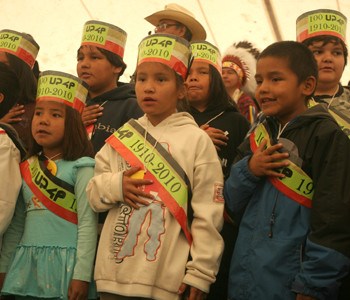As the children of Sandy Lake First Nation sang Oh Canada in Oji-Cree, Adam Fiddler’s eyes filled with tears.
It’s been 100 years since his great-grandfather Robert signed a treaty with Canada and as current chief of the 2,700 person reserve, Fiddler said it’s the young people who are pushing to have the original intent of that treaty recognized.
"Some would say that we have nothing to celebrate it’s been a hundred year of broken promises but I have hope I have hope for the future I hope to renew that vision that our forefathers had when they signed the treaty on behalf of our people. Today we renew that vision," Fiddler said.
The commemoration ceremony of the signing of Treaty No.5 took place on top of a muddy hill on Ghost Point Wednesday. Under a tent with hundreds in attendance, Fiddler said he hears stories from elders about a gold mine south of the community in the 1930s that made people rich while his people scavenged for scraps in a nearby garbage dump.
Fiddler said now he and other first nation leaders can sit at the table with the provincial and federal governments so that everyone can benefit from the original spirit of the treaty which was meant to symbolize two nations coming together and benefiting equally.
With 600 people between 18 and 29 in Sandy Lake, Fiddler said maybe 20 are employed. He said leaders from both nations need to get together to make a better community.
"All we’re asking for is the same as any other Canadian that opportunity that they have to live a quality of life to have an opportunity for employment an opportunity for income to put food on the table for our families," Fiddler said. "We’re living in one of the richest countries in the world yet our people are among the poorest of the poor."
NAN Grand Chief Stan Beardy said the next 100 years under the treaty needs to ensure a redistribution of wealth. Beardy said better houses, schools and education are needed for First Nation communities like Sandy Lake and that Canada has an obligation under international law with the treaty to do so.
"When I look back on the last 100 years our treaty partners got wealthy as a result of that treaty arrangement they access our natural resources and gain wealth," Beardy said. "We’re no longer content just to sit back collect a treaty payment and go home. What we’re telling the government is that starting today we will make every effort to do whatever is necessary to make sure that the legal obligations… my people must benefit from the wealth that’s created from the natural resources."
Assembly of First Nations Ontario Regional Chief Angus Toulouse said that with third world conditions in many first nations comminutes, the ceremony at Sandy Lake is more of a commemoration than a celebration.
"I wish we could be celebrating a wonderful hundred years but we commemorate that we’re still here we still have our spirituality, we still have our culture, we still have our language mind you there’s a lot that’s been missed, there’s a lot that’s been lost and we see a lot of rebuilding and revitalization taking place in a lot of first nation communities," said Toulouse.
As provincial politicians such as Chris Bentley and Andrea Horwath were at the ceremony in Sandy Lake, Toulouse said it was disappointing that federal Indian Affairs minister Chuck Strahl didn’t attend. Toulouse said it seems Strahl only pays attention to First Nation communities when they’ve taken direct action to get the federal government’s attention.
"It seems to me that the federal minister of Indian Affairs will only respond to those first nations that are ready to do that direct action. Is that the way to go? I don’t think so," Toulouse said.
Standing on the spot where the treaty was signed in Deer Lake, Chief Roy Dale Meekis said he’s honoured that the 100th anniversary came during his life.
"It’s a privilege that it came to in our lifetime 100 years is a long time," said Meekis standing on the spot where the treaty signing took place. "To remember what they agreed on and what they did here."
A community of 1,000, Meekis said Deer Lake suffers from high unemployment rates and high cost of living. He said that the people of Deer Lake were taught that the treaty was meant to benefit both native people and the "new-comers".
"We were raised to share our land. We were told to share our land and the treaty that was signed was supposed to work together with everybody," Meekis said.
